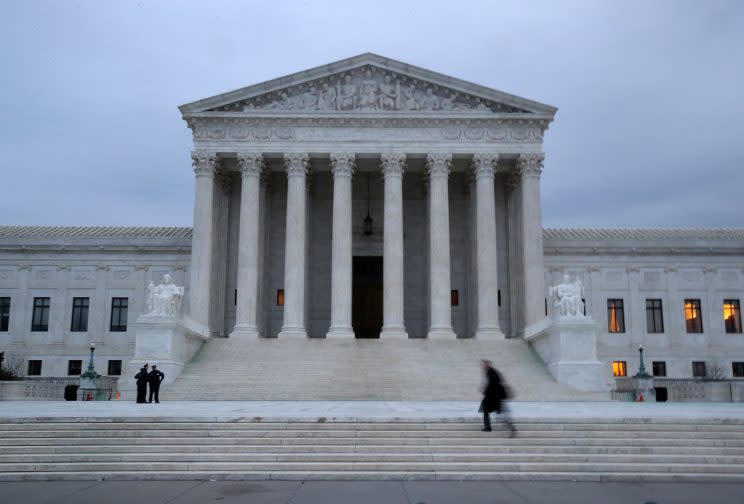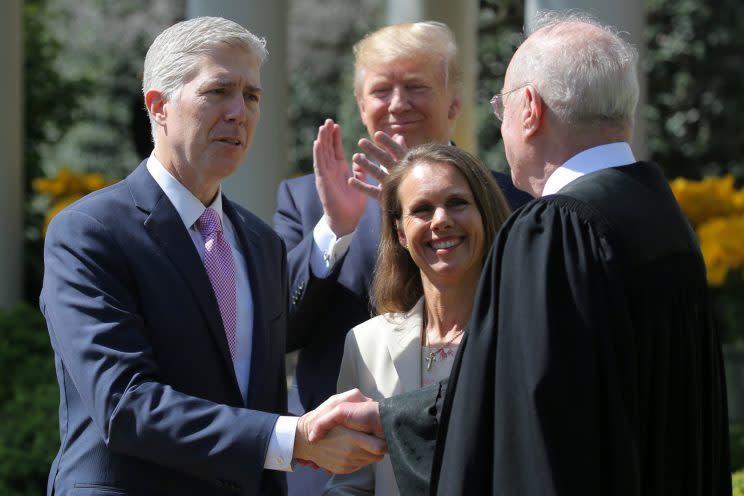SCOTUS Just Heard a Church Playground Case That Could Affect Birth Control Access

The Supreme Court heard oral arguments on Tuesday in the case of Trinity Lutheran Church of Columbia, Inc. v. Comer, a “religious freedom” case that could have big implications for contraception access.
The case involves a church preschool that was denied a grant from the state of Missouri to use recycled tires for the surface of its new playground on the grounds that there should be a separation between church and state. Based on this morning’s arguments, speculation is already emerging that the Court could likely side with the plaintiff, Trinity Lutheran Church — a ruling that experts say could create a slippery slope for women’s health.
Despite 15-month wait, this morning's oral argument suggests that Trinity Lutheran case may not turn out to be especially close after all.
— Amy Howe (@AHoweBlogger) April 19, 2017
Vote could be 6-3 or even 7-2, with both Kagan and Breyer seeming sympathetic to the church at times.
— Amy Howe (@AHoweBlogger) April 19, 2017
Though the preschool’s application ranked fifth out of a total of 54 applications received by the state of Missouri for its Scrap Tire Program, the state ultimately declined to award the church a grant to use recycled tires for the playground because doing so would have violated a provision of Missouri’s Constitution. The Missouri Constitution states that “no money shall be taken from the public treasury, directly or indirectly, in aid of any church, sect or denomination of religion.”
And it’s this provision that kept the Trinity Lutheran preschool from getting its grant — and new playground.
The church went on to legally challenge the decision, and both the district and appellate courts upheld the state’s decision to deny Trinity Lutheran the grant money. Now the church has argued before the Supreme Court that its exclusion from eligibility for the recycled tire grant violates the free-exercise and free-protection clauses of the U.S. constitution.
What does this have to do with birth control? Possibly a whole lot.
As Amy Matsui, senior counsel and director of government relations at the National Women’s Law Center, explained to Yahoo Beauty following Neil Gorsuch’s confirmation by the Senate, “If the court allows the church to receive public funds despite Missouri’s Constitution, it opens the door to public funds going without any safeguards to groups that might discriminate.”
And that includes religious institutions or schools that could discriminate on the basis of sex, sexual orientation, and religion.
“We know there have been religious employers who have fired employees for using birth control, for becoming pregnant without being married, for using assisted reproductive technologies to achieve pregnancy. If an institution that is engaged in discriminatory practices can receive public funds, we have serious concerns if there are not any safeguards or protections. It’s a slippery slope,” Matsui says.
Last week, before the case made its way to the Supreme Court, the Missouri governor’s office announced a change in the policy at the heart of this case, allowing for state funds to religious groups via grants that promote recycling, which led to speculation that the case would be thrown out. However, today SCOTUS Blog said that was not the case.
Justices also seemed inclined to go ahead and decide on the merits, despite MO governor's about-face on policy at issue last week
— Amy Howe (@AHoweBlogger) April 19, 2017
While newly appointed Justice Gorsuch doesn’t have much of a judicial record on issues pertaining to women’s reproductive health, he is known for his record of prioritizing businesses’ and private organizations’ claims to religious freedom over claims of discrimination.

One of his most notable rulings was when the Hobby Lobby case appeared before the 10th District Court of Appeals while he sat on that bench. In that case, Hobby Lobby asked that the company be granted the same kind of religious-freedom protections as an individual — and that such protections would allow the company to opt out of adhering to the Affordable Care Act’s mandate regarding contraception coverage in all health plans by not offering this to their employees through their insurance benefits.
Gorsuch wrote in his opinion on the Hobby Lobby case that the ACA’s mandate, and its requirement that all plans cover all forms of FDA-approved contraception, forced corporations such as Hobby Lobby “to violate their religious faith by lending an impermissible degree of assistance to conduct [that] their religion teaches to be gravely wrong.”
Many women’s health advocates continue to point out that a look at the Hobby Lobby case raises serious concerns over what Gorsuch might mean for contraception access, specifically for reasons that are again raised in the Trinity Lutheran case. In Hobby Lobby, Gorsuch ruled in favor of the idea that corporations are people and expressed his belief that bosses should be able to impede their employees’ access to birth control.
His fervor for protecting entities’ claims to religious freedom likely means that he would side with Trinity Lutheran’s claims — a move that, if agreed upon by the majority, could also mean that that companies could not only freely practice discrimination in the name of religion but also receive taxpayer dollars for doing so.
Read more from Yahoo Beauty + Style:
Follow us on Instagram, Facebook, and Pinterest for nonstop inspiration delivered fresh to your feed, every day. For Twitter updates, follow@YahooStyleand@YahooBeauty.
